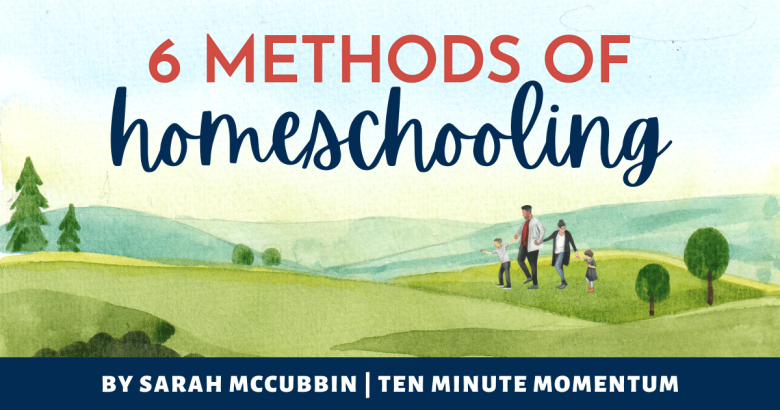-
This post is sponsored by Lone Star Homeschool Academy. Get your 14-day FREE trial!
by Sarah McCubbin from Ten Minute Momentum
As you begin your homeschooling journey, knowing the different methods of homeschooling can help you organize your day, choose curriculum and your extra curricular activities.
Not all homeschooling is the same and whatever you choose should be something you enjoy and that works for YOUR family.
As you begin to think about your homeschool philosophy or the method, examining your own “school” experiences can be a great place to start figuring out what kind of environment and structure would work best for your family. Whatever you choose…nothing is set in stone and can be changed!
6 Methods of Homeschooling
There are at LEAST 6 different methods of homeschooling but probably many more. Here are some of the most popular methods!
1. Unschooling Method of Homeschooling
Unschooling is the least structured of all homeschooling options. It believes that people will learn what they need to know to survive and meet goals in life.
Characteristics of Unschooling include:
- Unschooling parents will often let their children choose what they want to learn about.
- It is often referred to as experiential learning or nature-based learning.
- As children learn about their interests, other subjects are woven in naturally using many kinds of resources.
- Unschooling resists the idea that a standard curriculum, standardized tests, age-based classes, and traditional assessment methods are the most effective.
- Unschoolers learn through a wide variety of life activities and may choose to use books, hobbies, work, volunteering and interacting with family and friends to teach what their children want to learn.
Of all of the different methods of homeschooling methods, it is the most unstructured, and gives children the most responsibility in their own learning
2. Classical Homeschooling Method
Classical Homeschooling is based on the idea that the way children learn best changes with age and development.
It has three stages of education called the Trivium.
- Grammar Stage - lasts about 6 years and emphasizes memorization of facts, observation and inquiry. Children in this stage learn to read, write, listen and make observations and measurements.
- Logic Stage - lasts about 3 years and emphasizes understanding what they learn through critical thinking skills to discern motives, meanings, causes and effects.
- Rhetoric Stage - lasts 3 years during which students acquire knowledge but now apply wisdom. It has a heavy philosophy emphasis and focuses on discussions and asking good questions in groups.
The goal of Classical learning is to create a structured environment for the purpose of developing well-rounded adults who are able to live with purpose and intention and make sound decisions.
3. Charlotte Mason Homeschooling Method
Charlotte Mason Homeschooling is a hugely popular method, especially with families with young children. It is based on the life work of Charlotte Mason, an educator in the late 1800s and early 1900s.
Charlotte Mason homeschooling is marked by a few characteristics.
- Education should be for the whole person…not just the mind.
- It is marked by 3 prongs of education: A focus on the Atmosphere (Environment), Discipline (Habits and Character) and Life (Academics). First, Charlotte believed that one must educate the whole person…not just his mind, through academics.
- Living Books - Children learn from book that teach but are also interesting and were written by someone who loved teaching their topic. These might include literature, nature books, biographies or any other kind of engaging text…but not textbooks.
- Nature Studies - Through nature studies, children will learn to observe and draw their environment.
This method is great for a family that wants to slow down and incorporate a lot of reading and nature into their daily lives.
4. Waldorf Homeschooling Method
Waldorf education is based on the work of Rudolf Steiner. It hinges on the idea that people are body, soul, and spirit and all of those elements should be incorporated in their learning.
- The lower grades place a heavy emphasis on the arts and hands-on learning through drawing, music, outdoor play, movement and fantasy.
- Waldorf education prizes a slower start to the true academic subjects.
- In the upper grades, there is an emphasis on developing a scientific attitude, hands on education and personal experience.
- Waldorf education believes teaching social skills is as important as any other subject. In addition to learning life skills and problem solving, it emphasizes giving children opportunities to interact, practice apologizing and simple ways to navigate social situations.
The goal of Waldorf education is for children to develop into adults who have the freedom to choose their path through life.
5. Montessori Homeschooling Method
Montessori education is based on the method developed by Dr. Maria Montessori in the 1900s. It pairs a child’s interests with resources and curricula to build an educational experience that supports their curiosity.
You could say it is child led and teacher supported.
- Students learn concepts at their own pace
- Learning is guided by the desire to help children develop self-awareness, feel connected to others and become productive adults.
- Parents may function more as guides and models than directive teachers.
- It emphasizes keeping resources accessible to children at their own level so they can access what they need to learn.
- It often has a 2-3 work period in the day when children choose what to work on while being guided by and supported by a parent or teacher.
6. Eclectic Homeschooling Method
The last homeschooling method is the Eclectic Method. This is really for a mom that chooses to mix and match methods and curriculum.
In this method, you might unschool some subjects but use Classical resources for others. You might enjoy Montessori manipulatives while enjoying books from Charlotte Mason.
You won’t be able to buy a boxed curriculum that is going to have just the right mix. So, being an Eclectic homeschooler means that you value choice and should probably enjoy research too!
Let Your Values and Goals Drive Your Method
When choosing what homeschool method to use, let your values and goals be your guide. You may start with one method and change overtime, or you may choose one thing and stick with it. Give yourself the freedom to try new things to find the perfect fit for you and your family!
Read More!
- Log in to post comments

